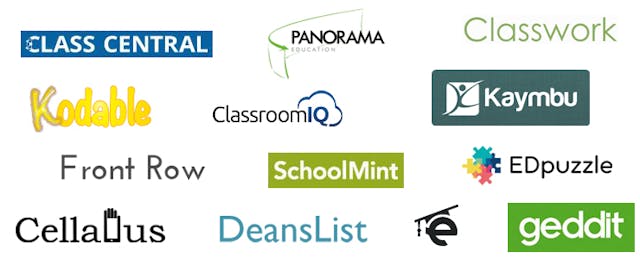Fifty-three companies. Over 100 founders. And upwards of $60 million dollars raised.
These were the latest stats from Imagine K12 shared by co-founder and partner, Tim Brady, as he kicked off the fifth demo day for the Palo Alto-based edtech accelerator.
Since its start in 2011, Imagine K12 has inspired a host of other edtech accelerators around the region. “We were the first,” said Imagine K12 co-founder and partner, Geoff Ralston. “And when we ended 2013, there were over a dozen of them.” (We’ve been keeping tabs on the “edu-bator” surge here and here.)
The Winter 2014 class members were the first to receive about $100K apiece from the new Imagine K12 Startup Fund instead of the early funding of less than $20K apiece. The more generous allowance attracted quite a bit of attention when it was announced in April 2013. Over 400 teams applied. The thirteen that made the cut spanned across the globe and included entrepreneurs from Spain, Chile, Australia and India.
Here’s a snapshot of the thirteen graduates.
Cellabus: Corporations have tools for managing the proliferation of mobile devices that employees bring too work; why shouldn’t schools have their own management tools? Cellabus helps K-12 educators deploy apps, keep track of who’s using what, enforce technology policies, and provide real-time feedback of app usage on Apple (iOS and OSX) devices. Co-founder Yorman Garcia says schools “often don’t have the IT capabilities of Google,” making enterprise-level device management tools difficult to adapt.
Class Central: So many MOOCs, so little time! Class Central is a directory of more than 1,200 classes offered by MOOCs including the “big three” (Coursera, edX and Udacity) as well as hundreds of other classes offered by universities around the world. The company was started by Dhawal Shah soon after Stanford University professors started offering massive online classes. He may be a tad bit miffed that he forked out $60K for a Masters degree in computer science at Georgia Tech, which now offers a similar online program for $6,600 thanks to a partnership with Udacity. But Shah believes in the power of online education and makes it easy to find and take such classes.
ClassroomIQ aims to make it easier for teachers to grade open assessments and assignments. As schools move away from multiple-choice assessments to more open-ended tests, ClassroomIQ offers a tool that lets teachers scan assignments, isolate individual problems, group all student responses to an answer, and grade in a more efficient manner.
Classwork is a tablet app that works like a white board: when students do work within this app, teachers can instantly see what they’re doing and give feedback and so do real-time checks for understanding (CFUs). Teachers can also track ongoing work by seeing a screenshot of all students’ workspaces. Teachers can also add comments to individual student workspaces or offer “hints” to classes as a whole.
DeansList hopes to show schools that there is more ways to recognize student achievement beyond highlighting academic successes. Co-founder Matt Robins says the company is re-inventing the gradebook with a special focus on life skills--grit, tenacity, and perseverance are the current buzzwords--that students need to carry into the real world alongside academic knowledge.
Edoome is described by its founders as “the Edmodo of Latin America.” The platform provides teachers with an online community space to create class pages, interact with students, collaborate, and conduct/track online assessments as well as the support to comply with local education regulations.
EdPuzzle helps teachers customize video content for their classroom by giving them a simple process to edit existing videos, add voiceovers and embed quizzes. Teachers can then assign the video to students and track their viewing history and quiz results.
Front Row was cofounded by hacker Sidharth Kakkar and engineer Alex Kurilin, two Carnegie Mellon graduates. Following the development of an adaptive language development product, the two founders decided to build a math adaptive app for iPads and Chromebooks to serve up the kinds of problems that occupy the 40% of a math lesson typically dedicated to independent practice.
Geddit is a mobile app that allows students to give teachers immediate feedback on whether they understand material. Students can check in multiple times throughout a class, rate their confidence around a given topic, and privately send their feedback to their teacher who can then see whether the class is understanding the lesson.
Kaymbu is tackling the sweet spot between early childcare compliance and parents’ desire to check-in on their tiny tots. It makes it easy for teachers to send parents pictures, documents and comments how on their childrens’ activities in, say, PreK. The company name, which is pronounced “kahm-boo,” is the master work of founder Kin Lo’s young daughter and her unique pronunciation of “Cambridge,” where the company is based (Beantown, not Bangers and Mash).
Kodable is riding the wave of the “learn-to-code” movement. Founders Jon Mattingly and Gretchen Huebner want to get kids hooked early with an app that teaches the fundamentals of programming in a game-like fashion. The app uses symbols instead of language so kids can learn programming without having to read. Says Mattingly: “The earlier you learn something, the better you will be at it later on in life.”
Panorama Education provides schools and districts with the tools to create and deliver surveys of student feedback, collect the data, and analyze the results to make sense of the responses. The team works with customers to craft surveys to capture the student point of view on every area of school life.
SchoolMint aims to unsnarl a problem familiar to both school administrative offices and parents: dealing with all the paper forms that comes with school applications. SchoolMint is an online portal that allows parents to apply to one or more schools; schools can use the software to manage the admissions process.


